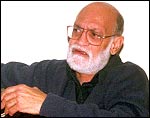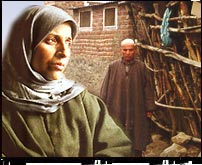Murder, rape, abduction...
Violations continue
in the valley
Chindu Sreedharan
Every little detail of that incident is burnt deep in Ghulam Nabi Ganai's memory.
November 12 was a Friday. At 0830 hours his family had finished tea. His 26-year-old daughter Rifat Ara was cleaning their house in Kajabagh, Baramulla. And seven Jammu and Kashmir policemen barged in.
"They didn't let me say anything. Just put the gun on me and ordered me out," Nabi says. "Then they went upstairs."
The police were searching for Shaukat Hussain, Rifat's husband. Nabi describes him as a surrendered militant who is now "nothing more than a goonda."
The cops came down quickly. They ordered Rifat to accompany them. When she refused, they pulled her out of the house by her hair.
Outside Nabi's younger son, 14-year-old Ali Waheed, watched his sister being dragged out. He tried to stop it. As her assailants forced her towards the waiting vehicle, the boy caught hold of Rifat's pheran (a loose coat).
For that, he paid with his life.
"I saw the havaldar (head constable) signalling the constable... and he shot my son in the chest," Nabi says.
His eyes are dry. But his voice, which had been steady, breaks slightly. "Ali didn't even cry out. He just fell down and died."
Rifat, meanwhile, had been pushed into the vehicle. She was made to lie on the floor. The policemen placed their booted feet on her, and the vehicle set off for Srinagar.
"It was winter... I didn't even have sandals on my feet," Rifat says. "They threatened me, abused me... said they would bring my little daughter and lock her up with me. I told them I didn't know where my husband was... I never wanted to marry him... He forced me to. He said he would kill my family if I didn't marry him..."
In the evening, the Baramulla police reached Srinagar. They found Rifat huddled in the corner of a lockup, shivering with cold and fright.
"They didn't tell me my brother was dead," she says. "They brought me back home... and here I saw..."
Ali Waheed's is not the first such killing in Kashmir. Nor will it be the last. Ten years into full-blown militancy, no one will deny that human rights abuses continue. Differences appear only about the degree and number of violations.
Not surprisingly, the Indian authorities and Kashmiris take up opposing stands. While the former claim that violations are now minimal, the latter hold that the situation has worsened. Sample these sentiments:
"They don't consider us human. So where does the question of rights come in?" asks a lawyer in Baramulla, who requested anonymity. "The law here is the security personnel. If they want to kill you, they will kill you..."
"Every single day Kashmiris are being killed and abused. The human rights situation is at its worst now," a civilian tells you in Anantnag. "I have only one question to the Almighty: why was I born a Kashmiri?"
The All-Parties Hurriyat Conference, the umbrella organisation of separatist forces, claims that between October 8, 1996, and October 31, 1999, the state saw an average of six civilian killings a day. And five rapes every month.
The Indian authorities dismiss this as propaganda. They say it is just an attempt to focus international attention on Kashmir.

"We have had incidents, certainly. But if you look at the track record of the Indian army and other forces, they haven't gone out of hand," says Jammu and Kashmir Chief Secretary Ashok Jaitley. "There is no question of increase or decrease... as the incidents take place, action is taken against them. "
If the situation was as bad as it has been portrayed, authorities ask, how come human rights bodies and the media aren't kicking up a row?
Human rights lawyer Parvez Imroz and journalist Zahir-ud-din, who's researching the subject for a book, offer explanations.
"The pattern of killings has changed," says Imroz. "Unlike in the early '90s, people are not killed in 20s and 30s today. So it doesn't grab headlines."
"Earlier violations were more in urban areas. Now these have shifted to villages from where reports are rare," adds Zahir-ud-din.
The 'unscientific' approach of outfits like the APHC is also to blame. "There was a lot of exaggeration about incidents. Many groups have thus lost credibility," says Imroz.
Another reason could be this: the world mainly depends on the national media for reports on Kashmir. And many Indian newspapers consider it 'unpatriotic' to carry articles that go against government forces.
For its part, the Jammu and Kashmir Human Rights Commission, which came into existence just two years ago, says the situation has improved. It received 469 complaints from the valley and 93 from Jammu since it came into being. Of these 174 complaints have been disposed of.
Sorry, but mere thrashings, abuses and harassment don't qualify as rights violation in today's Kashmir. These mostly go unrecorded: it would take an army, and fill up volumes, if all such instances were to be put in ink.
Violations, thus, are broadly classified into three. Disappearances, custodial killings and extra-judicial executions. All three categories, according to many Kashmiris, have been recording instances.
"People were under the impression that violations would stop once a democratic government came to power," says Zahir-ud-din. "Unfortunately, in the last two years the number of custodial killings and disappearances has only increased."
And who's the main culprit? The Indian Army or the paramilitary?
Neither. It is the Special Task Force (or the Special Operations Group) of the state police. Born in 1994 with less than 10 personnel to counter insurgency, it has grown into a massive force. It holds the best anti-militancy record in the valley. Better than the army's, the BSF's or the CRPF's -- and also the worst in human rights.
"It is as if the government has given it a licence to kill," says Zahir-ud-din.
The creation of a renegade force to fight militancy, thought it paid dividends, has brought with it dire consequences. The pro-India militants now work in tandem with the STF and are, like the police force, dreaded by everyone. Even army and paramilitary officials agree that they need to be contained.
"They are criminals. They have weapons. They rape people, there's extortion... They walk into any house, take away jewellery, take away girls..." says a Kashmiri, who understandably doesn't want to be identified. "Since the National Conference government doesn't have any popular footing they are relying on this STF. They use them in elections, they use them all the time."
The police deny this hotly. "This is a campaign by the militants to malign the force in the valley," a senior officer holds.
Excesses will continue as long as militancy exists Read on...




